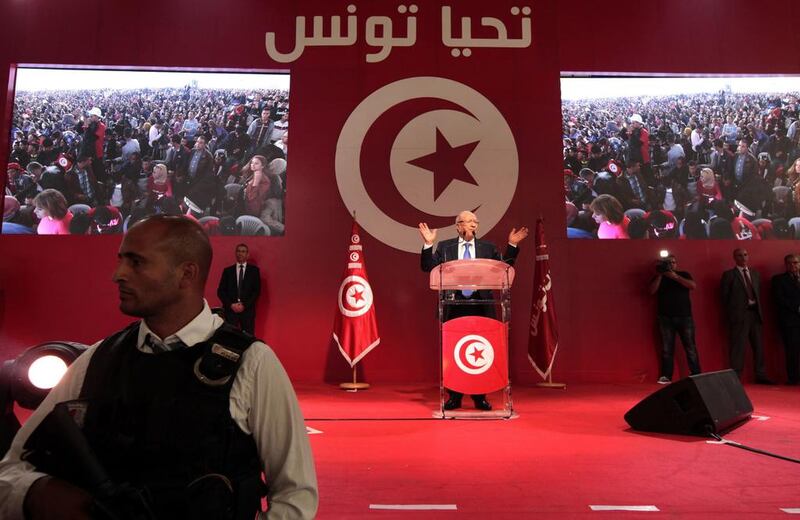TUNIS // As the fishing boat pulled out of the Mediterranean port of Bizerte, its crew shouted political slogans across the water to a small crowd gathered to hear presidential candidate Moncef Marzouki.
One fisherman climbed on to the roof of the boat to dance a quick jig, as loudspeakers on the quayside blared out a song from Tunisia’s 2011 revolution. Despite tensions over the faltering economy and terrorism, voters’ good humour – and confidence in their new civil liberties – look set to hold for Sunday’s vote for president.
“Don’t look to me to defend the revolution!” Mr Marzouki told the rally on Wednesday, referring to the spontaneous uprising of January 2011 which overthrew the regime of Zine El Abidine Ben Ali.
“It is you, the Tunisian people, who carried out your revolution, and it is you who will defend it.”
He urged voters to turn out on Sunday for their “appointment with history, not just for the sake of Tunisia but for the whole Arab nation”.
The rest of the region is looking to Tunisia to prove that an Arab country is capable of democracy, he said.
In the final days of campaigning for what is billed as the country's first free and fair presidential election, leading candidates have toned down their mutual accusations and have signalled a willingness to work together to ensure the country continues as a rare success story from the "Arab spring".
The two leading candidates from Sunday’s vote are to go through to a second round on December 28, assuming neither passes the 50 per cent threshold to win outright.
Opinion polls suggest that veteran politician Beji Caid Sebsi – whose Nidaa Tounes party last month unseated the Islamists of Ennahda in elections to a new legislature – will garner most votes.
Mr Caid Sebsi was interim prime minister for 10 months in 2011, and three times a minister under the post-independence authoritarian president Habib Bourguiba. His second-round challenger could well be Mr Marzouki – the incumbent president and a former coalition partner of Ennahda.
Mr Marzouki was elected president in December 2011 by the constituent assembly.
Nidaa Tounes has 86 seats in the new 217-seat assembly. It is expected to finalise a ruling coalition once the race for president has been decided.
Mr Caid Sebsi, when asked on Tuesday about the possible inclusion of Ennahda politicians in a cabinet headed by Nidaa Tounes, reiterated that he would accept any alliance that was “in the country’s interests”.
Ennahda has declined to present its own candidate for president, nor has it officially endorsed Mr Marzouki.
Ennahda leader Rached Ghannouchi succeeded in convincing his grassroots that it was important to avoid a potentially polarising stand-off between an Islamist candidate and a non-Islamist one. However many Ennahda supporters, and other Tunisians concerned that Mr Caid Sebsi’s party represents an authoritarian throwback, are expected to give their votes to Mr Marzouki.
Like his former coalition partner Ennahda, Mr Marzouki this week called for the formation of a “government of national unity” to represent “all political currents, all regions and all classes”.
Mr Caid Sebsi’s camp meanwhile has offered assurances that a government led by Nidaa Tounes would respect civil liberties.
Alternative contenders to go through to the second round of the presidential election are Slim Riahi, a young businessman angling for the youth vote who is also president of the popular Tunis football team Club Africain, and veteran dissident Hamma Hammami, who leads the Popular Front, an alliance of leftist parties. The only woman in the field of 22 (after five candidates withdrew) is judge Kalthoum Kennou, respected for her record of independence from the former Ben Ali regime.
The final week of campaigning saw candidates criss-crossing the country to address packed sports stadiums or small audiences in community halls. They met face to face with voters in events ranging from a walkabout in an abattoir, focusing on rising meat prices, to a gathering of artists and writers looking for pledges on creative freedoms.
Candidates have been given armed police protection after the interior ministry warned of threats to their safety, apparently from Islamist extremists hoping to disrupt the election.
Mr Riahi’s campaign team said they had called off rallies after the ministry reported that a suicide bombing was planned against the candidate. Instead, Mr Riahi opted for walkabouts – including one in a Tunis neighbourhood, Douar Hicher, known for its conservative Islamists, to show that he was not intimidated.
Such warnings have hiked tensions ahead of the vote. On Wednesday, the ministry said a “dangerous terrorist element” had died in an exchange of fire with national guard officers in the central Sidi Bouzid region.
Mr Caid Sebsi had campaigned in the region on the same day amid extremely tight security.
foreign.desk@thenational.ae





